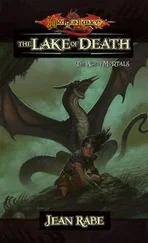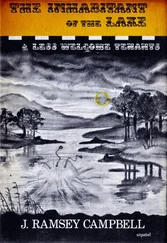“There’s no one watching above at the gate?”
“Nobody. You were very hard on poor Jamesie,” Ruttledge said.
“That’s the only way to give it to him,” he grinned in triumph. “He’s too newsy.” He lifted the two buckets out of the fuchsias and, gripping the blackthorn against one of the handles, headed towards the lake.
His kind was now almost as extinct as the corncrake. He had fled to his present house from the farm he first worked on. When he was fourteen years old he had been sent out from the religious institutions to that first farm. Nobody knew now, least of all Bill Evans, how long ago that was.
One cold day, several years earlier, they had gone away, locking him outside, warning him to watch the place and not to wander. They were an unusually long time away. Towards evening he could stand the hunger no longer and came to Ruttledge. “Get me something to eat. I’m starving.”
“What’s happened?”
“They went away,” he admitted reluctantly.
There was little food in the house. Kate had gone to London and Ruttledge was housekeeping alone. “You’re welcome to anything in the house but there isn’t even bread. I was waiting till tonight to go to the village.”
“Haven’t you spuds?”
“Plenty.” He hadn’t thought of them as an offering.
“Quick, Joe. Put them on.”
A pot of water was set to boil. The potatoes were washed. “How many?”
“More. More.”
His eyes glittered on the pot as he waited, willing them to a boil. Fourteen potatoes were put into the pot. He ate all of them, even the skins, with salt and butter, and emptied the large jug of milk. “God, I feel all roly-poly now,” he said with deep contentment as he moved back to the ease of the white rocking chair. “Do you have any fags?”
The small ration was taken from the shelf. A cigarette was lit. He smoked, inhaling deeply, holding the smoke until the lungs could no longer bear the strain, and then released the breath with such slow reluctance that the smoke issued first from the nostrils before gushing out on a weak, spent breath. So deep was his pleasure that watching was also a dismaying pleasure. For once he was in no anxiety or rush to leave, and Ruttledge began to ask him about his life, though he knew any enquiry was unlikely to be welcomed. Already he knew the outlines of such a life.
He would have known neither father nor mother. As a baby he would have been given into the care of nuns. When these boys reached seven, the age of reason, they were transferred to places run by priests or Brothers. When he reached fourteen, Bill Evans was sent out, like many others, to his first farmer.
They were also sent as skivvies to the colleges; they scrubbed and polished floors, emptied garbage and waited at tables in the college Ruttledge attended. He recalled how small the boys were in their white jackets, the grey stripes of their trousers, their crew-cut heads, the pale faces tense and blank. No words were allowed to pass between them and the students. They brought huge trays of fish or meat, bowls of soup and vegetables, baskets of bread, and on Sundays glass siphons of red lemonade with silver tops. The place was so bleak that the glass siphons were like flowers on the table for the one festive day of the week. What went on in the kitchens behind the heavy oak partition was a hubbub of distant sound from which the occasional crash or cry or shout emerged. In his long black soutane and red burning eyes under a grey crew-cut, the dean of students was a sinister figure, never more so than when he smiled weakly. He walked up and down between the rows of tables or stood under the big crucifix between the high windows. He read out notices and issued warnings and with bowed head intoned the prayers of grace before and after meals. As he walked slowly up and down between the tables he read his Breviary, pausing now and then to cast an unblinking eye on any table where there was a hint of boisterousness or irregularity. Such was his reputation that cutlery was often knocked to the floor or scattered in the nervous rush towards correction. Then, with a chilling smile, he would pass on, returning to his Breviary, resuming the metronomical walk, until pausing to rest his gaze on an upturned salt cruet. Around him the boys in their short white coats hurried between the kitchens and the tables.
One morning a boy turned quickly away from a table and found the Dean unexpectedly in his path and went straight into him with a tray. Plates and bowls went flying. The soutane was splashed. Only the students who were seated close to the accident saw what happened next, and even they weren’t certain. In the face of his fury it was thought that the boy broke the rule of silence to try to excuse the accident. The beating was sudden and savage. Nobody ate a morsel at any of the tables while it was taking place. Not a word was uttered. In the sobbing aftermath the silence was deep and accusing until the scrape of knife and fork on plate and the low hum of conversation resumed. Many who had sat mutely at the tables during the beating were to feel all their lives that they had taken part in the beating through their self-protective silence. This ageing man, who could easily have been one of those boys waiting at tables or cleaning the kitchens if he hadn’t been dispatched to that first farm, sat at ease and in full comfort in the white rocking chair, smoking, after having eaten the enormous bowl of potatoes.
“You were sent out to that first farm when you were fourteen?”
“Begod, I was.”
“You worked for them for a good few years before you ran away to here?”
“Begod, I did.”
“They didn’t treat you very well?”
For what seemed an age he made no attempt to answer, looking obstinately out from the white chair that no longer moved. “Why are you asking me this, Joe?”
“Everybody comes from somewhere or other. None of us comes out of the blue air.”
“You’ll be as bad as Jamesie soon,” he answered irritably.
“Weren’t you in a place run by Brothers and priests before they sent you to the first farm?” Ruttledge ignored the rebuke. A troubled look passed across Bill Evans’s face as swiftly as a shadow of a bird passing across window light and was replaced by a black truculence. “Before the priests and Brothers weren’t you with nuns in a convent with other small boys? Weren’t you treated better when you were small and with the nuns?”
This time there was no long pause. A look of rage and pain crossed his face. “Stop torturing me,” he cried out.
Taken aback by the violence and ashamed now of his own idle probing, Ruttledge answered quickly, “I’d never want to do that. I’m sorry there’s so little food in the house.”
“The spuds were topping, Joe. They have me packed,” he said rising stiffly from the chair, leaning on the rough handle of the blackthorn. “They left me in charge and could be home any minute now. I’d want to be above when they get back.”
Now, several years later, Ruttledge watched him toil slowly down to the lake with the two buckets. Every day since he and Kate had come to the house, Bill Evans had drawn water from the lake with the buckets. In the house, Kate and Jamesie were talking about him still.
“I told you, Kate, you are too soft,” Jamesie argued. “The decenter you treat the likes of him the more they’ll walk all over you.”
“What else has he ever known?”
“You’ll be the one to suffer but you could be right in the long run,” Jamesie yielded in his agreeable way. “What was done to him was wrong and they could never have luck. When Jackie was drawing to the creamery Bill had to ride on the trailer behind the tractor in rain and wet, get down at gates and throw those heavy cans up on to the trailer. When the cans were full he was barely able. They’d put a stronger man to the pin of his collar. As soon as the can touched the trailer, Jackie would lift his foot off the clutch and turn up the throttle. Bill had to run and scramble up on the trailer after the cans. There were times when he fell. Jackie would kick him if he had to stop the tractor and climb down. Christ hadn’t much worse of a time on the road to Calvary except Bill always came home alive with the cans of skim. It got so bad that Guard Murray had to warn Jackie.”
Читать дальше












